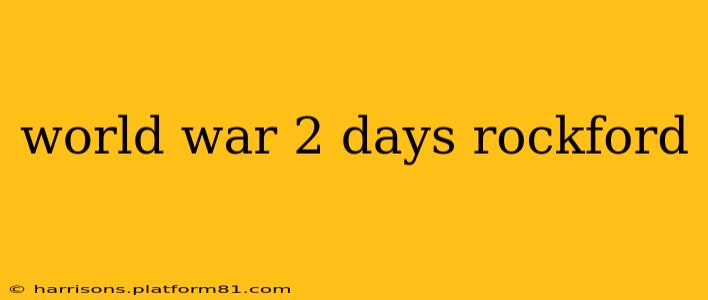Rockford, Illinois, like many American cities, played a significant role during World War II. Far from the front lines, its contribution was vital to the war effort, transforming its industry and daily life in profound ways. This article explores Rockford's experience during the war years, addressing common questions and delving into the city's unique contributions.
What industries in Rockford supported the war effort?
Rockford's robust manufacturing base was quickly repurposed for wartime production. Several key industries saw significant shifts:
-
Machine tools: Rockford was already a center for machine tool manufacturing. Companies like Rockford Machine Tool Company and Sundstrand Machine Tool Company shifted their production to create tools vital for building tanks, airplanes, and ships. This precision engineering was crucial for the Allied war effort.
-
Automotive parts: While not a major auto manufacturing hub, Rockford's factories produced crucial components for vehicles used by the military. This involved everything from engines and transmissions to body parts.
-
Agricultural equipment: Although seemingly unrelated, the agricultural machinery produced in Rockford played a significant role. Maintaining food production at home was paramount; reliable equipment was necessary to feed both the American population and Allied forces.
How did Rockford's citizens contribute to the war effort?
Beyond the factories, Rockford's citizens engaged in a multifaceted contribution:
-
Military service: Thousands of Rockford residents served in the armed forces, fighting on multiple fronts. Their sacrifices were felt deeply within the community.
-
War bond drives: The city actively participated in war bond drives, raising significant funds to support the war effort. These drives became community events, promoting patriotism and shared sacrifice.
-
Rationing and conservation: Rockford citizens endured rationing of essential goods like gasoline, sugar, and coffee. They also participated in conservation efforts, recycling materials and limiting energy consumption to support the war effort.
-
Civilian defense: Local air raid wardens and other civilian defense personnel were trained and prepared for potential attacks, though thankfully, Rockford was never directly targeted.
What was daily life like in Rockford during WWII?
Daily life was significantly altered:
-
Shifting workforce: The war effort dramatically changed the workforce. Women entered the factories in large numbers, filling jobs traditionally held by men who were serving overseas. This reshaped social dynamics and contributed to significant social change in the post-war era.
-
Increased population: The influx of workers from other areas led to a population surge, putting a strain on housing and other resources.
-
Community spirit: Despite the challenges, a strong sense of community and shared purpose emerged. People rallied together to support the war effort, creating a unique sense of collective identity.
What are some notable stories or events from Rockford during WWII?
While detailed records specific to Rockford's localized war experiences might require deeper archival research, the broader narrative of industrial conversion and civilian contribution applies strongly. Stories of individual Rockford citizens serving in the military, working in factories, or participating in community initiatives represent a rich, yet often untold, history. Local historical societies and archives can provide more specific details on individuals and events.
Were there any significant impacts on Rockford's economy after the war?
The war years significantly boosted Rockford's economy. Post-war, however, the city faced the challenge of transitioning its industry back to peacetime production. While some factories returned to pre-war products, others diversified, leading to a period of economic adaptation and restructuring. The wartime experience, however, left a lasting legacy on Rockford's industrial identity and its place in the national narrative of World War II.
This overview aims to paint a picture of Rockford's experience during World War II. Further research into local archives and historical societies can provide more detailed and nuanced accounts of this important period in the city's history.
